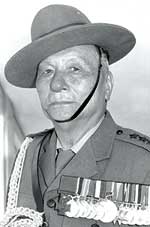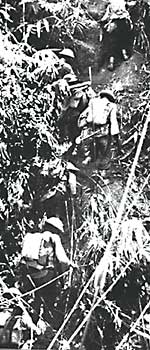 His story appears with those of other Gurkha soldiers in Lahurey ka Katha, translated by Dev Bahadur Thapa for Nepali Times.
His story appears with those of other Gurkha soldiers in Lahurey ka Katha, translated by Dev Bahadur Thapa for Nepali Times. Ienlisted in the British Army in 1942 at Ghoom, Darjeeling. In March 1943 we were sent to Burma. We joined our regiment in village called Badrokuna where we were divided into companies. Mine had 180 men and we were sent to the frontline every day. We fought for a year in Burma. Once we plunged into war, there was no room for fear. The only thought that haunted us was whether we would be able to return home.
Occasional misadventures took place. Sometimes the enemy surrounded us and we had to fight our way out. At a place 33 miles from Imphal, the capital of India's state of Manipur, our forces cut the Japanese off and many enemy soldiers were killed. Their tanks attacked us during the day and the troops came out at night. On 17 May 1944 I blew up two tanks. That same night, we massacred a 17 truck convoy of 330 enemy soldiers and took their ration and ammunitions.
As fresh reinforcements came, the Japanese became stronger and we were forced to retreat. We rested at Bishnupur village inside Manipur for a week, after which, we were assigned to defend the brigade. Another regiment was stationed six miles ahead of us. Their orders were to check enemy advancements. One day, six Japanese tanks wiped out a company of Agam Singh Rai's regiment. We were told the second fifth regiment was in trouble, and had to attack and reverse the situation.
This was not easy. We walked in the scorching sun and planes bombed us. There was artillery fire and tanks too. All we could do was hide in the hills and attack because we had no tanks.
Then we had the chance to lead an offensive against six Japanese tanks. It was dangerous because they were advancing in an open field and could crush anything. Then they came to a strait. On one side was a river and a bog on the other-if a tank sinks in the bog, it is impossible to get out. I crawled along the path, barely bigger than a mule track, and blew up the first tank with a six-pounder ball. The second met the same fate. I attempted to destroy a third but it took cover.
 It was then that I realised that I was a sitting duck out in the open too. The Japanese opened fire from machine guns and I was hit on my left leg, left and right hands. I was forced to drop my gun. I needed to take cover. Since my leg was broken, I dragged myself to safety in a shallow ditch. Six enemy soldiers came towards me, their bayonets shining in the sunlight. I thought it was going to be my last fight. Then I remembered I had hand grenades. With one finger almost severed and my hand slippery with blood, I removed the pins with my teeth and threw the grenades in the direction of the enemy. It kept them at bay and luckily, the debris from the continuous blasts covered me. The tank's crew passed me by without seeing me.
It was then that I realised that I was a sitting duck out in the open too. The Japanese opened fire from machine guns and I was hit on my left leg, left and right hands. I was forced to drop my gun. I needed to take cover. Since my leg was broken, I dragged myself to safety in a shallow ditch. Six enemy soldiers came towards me, their bayonets shining in the sunlight. I thought it was going to be my last fight. Then I remembered I had hand grenades. With one finger almost severed and my hand slippery with blood, I removed the pins with my teeth and threw the grenades in the direction of the enemy. It kept them at bay and luckily, the debris from the continuous blasts covered me. The tank's crew passed me by without seeing me. Shortly afterwards, my platoon arrived and I was taken to the regimental first aid post on a stretcher. From there it was the brigade hospital and then an overnight journey to the military hospital at Manipur where I was operated. I slept for four days and woke up in bed surrounded by a white mosquito net. I was forced to stay in the hospital for nearly two weeks. After the recuperation period, I was taken to Dhaka by plane where I heard that I was awarded the Victoria Cross. I didn't know quite what to think because I did not know how important it was.
When I enlisted, I was called Ganju instead of my proper name of Gyamchho, and it stuck. The government in Delhi informed my village that Ganju Lama received an award and inquired about my family so they could be there at the investiture. My father flatly denied having a son with the name Ganju. They made enquiries in Nepal and the Nepalis suggested they try in Sikkim again. The king of Sikkim too was confused till he figured it out and my father was informed. Sikkim's prestige was at stake so they coached my father and brother on how to behave at the Delhi durbar. The king made them bakkhus of Chinese silk and traditional caps for the ceremony. After I was awarded, my father returned to Sikkim. I went back to my regiment. (Concluded)


